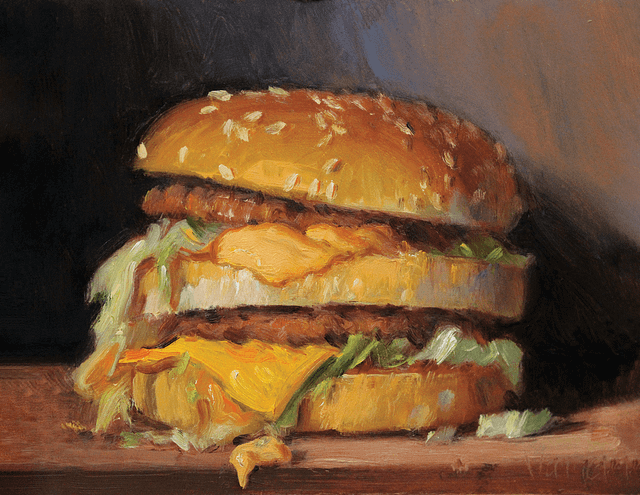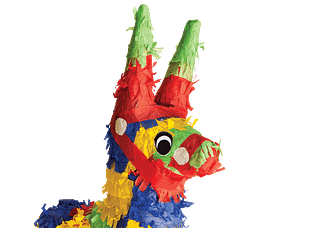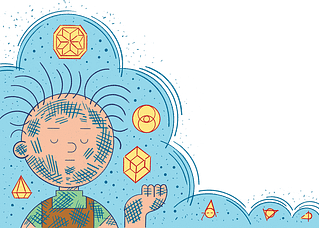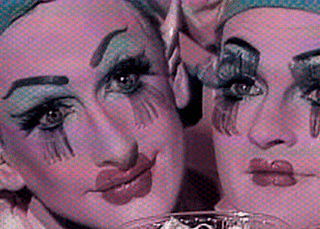
Dear McDonald’s—
When I called my friend Amy to try to explain why I was writing this letter to you, she asked, “Are you trying to say that a marginal life will always unfold in a marginal place?” To which I responded, “God, Amy, yes.” So then I called my friend Heather, who knows more about the design of commercial spaces, and she said, “Have you heard about the third place theory?” She said, “A third place is a place that is not home and not work but still wants us to stay awhile, to feel, even, a sense of belonging while we are there. It can be a library or a coffee shop or a bookstore or even a McDonald’s.” And I had to ask, “What is a third place when a person has no first or second place?”
McDonald’s — when my sister and I were homeless and addicted to methamphetamines and difficult to love, you let us in. Or rather your employees let us in. When we lied and said you’d gotten our order wrong, even though no order had actually been placed, you knew we were lying and fed us anyway. Was this a strategy devised in a boardroom, an attempt at warm brand association? We lied to you over and over, but it was your policy to believe us even when no one else would. You did ask, once, to see a receipt when we wanted too much. You looked at us, exhausted, from behind the black touch screen and said, “We can give you the ten McChickens but not the three Big Mac Meals.” You were setting boundaries with love. Is this what love looks like? we wondered. Neither of us was able to recognize it. But we felt the truth in our hardly there bodies and said, “Okay.” We took the food with desperate gratitude and walked along the highway, passing the paper bag between us. Later, while my sister waited outside with her new boyfriend, I injected drugs in your bathroom. One of your employees came and knocked on the stall door and I said I’d be out soon. “Thank you,” he said. “You’re welcome,” I said. Afterward, too high to even speak, I cupped my hands under the ice machine. The cubes dripped between the gaps of my fingers as I walked — annihilated — out the door into the parking lot, where the sun bounced off the hoods of a dozen Ford Focuses.
We know what it’s like to be ignored. To be ugly to everyone, even to you, McDonald’s, and to your sad, judgmental customers. But would you die for us? I would never ask you to. But will you say it? When all the other customers have gone and it’s just me, nodding off in a booth while Kaylin, the assistant manager, mops the floor, could you whisper it to me? Just say, I’ll do anything for you.
What were the chances my sister and I would both end up shooting meth in an abandoned camper at the edge of the Saline River? The chances were high. You must have known that. A little math — location plus sexual orientation plus adjusted gross income — would have told you as much. Yet somehow you loved us before we were even born. Through some deep market research, you named our future desires, you knew our favorite item on the Dollar Menu before we could speak. A brand can draw you toward it, gentle as a drain. The ads work best when we don’t know they’re working. When we were young, you dressed yourself up like a clown. We longed to crawl inside of that clown, into a place where we could eat and be eaten forever. Where does a craving come from? I needed you, McDonald’s. You taught us how to do the clown voice so that when you were gone, we talked to ourselves and pretended we were you. A craving only ever leads to another craving.
You could project with your all-seeing eye: a hologram of my sister and me as young parents, with our heads of matching curly hair, on the front porch of our mother’s new mobile home, laughing at our own children, who are playing hide-and-seek just out of frame. Our parents wonder, Where did that version of the adult siblings go? Five to seven years later, we would both be sitting in a drug dealer’s basement waiting for someone to pass a broken pipe, not knowing or wondering in those feral minutes where our precious children were or who was laying out their clothes for school. How did we even get there? I could say it started in the doctor’s office, or when the prescription pain pills weren’t enough, or when I started shooting heroin at thirty-five years old, or later when, trembling from opioid withdrawal, I rode with my sister to an apartment building just outside of town to buy meth for the first time, or when we stood in her kitchen afterward, snorting little bumps off the warped countertop. In a room on the second floor of the Economy Inn, high on the horror, my sister and I were like two insects trying to split a grain while our parents turned away from their children’s ugly lives, the same way they had turned away from their own.
By the time my sister and I entered high school we were home alone every day for weeks and we fought. I stood at the foot of the stairs and hit her with a hanger. The sound of her cries etched a message onto my muscles and that message was, You are disgusting. I was not her mother or her father. We are two years apart and I remember a time our mother chased me across the yard with a hanger and who was I when my sister needed me? What did we have there in the lonely housing projects, in the quiet apartment? The ability to care for each other, at twelve and fourteen. To watch each other for a signal as we passed a joint on the porch while Larry, the mechanic who lived next door — grinning, his eyes watering with senile delight — showed us a blurry tattoo of a smiley face on the tip of his limp penis. He did it so casually, like he was telling a joke.
There is no such thing as free will. Corporations have wagered the wealth of empires on this idea and won. They read the research on addiction, fished the information from the pockets of a million dead addicts, used it against us so that we would buy more cheeseburgers. We chose you, we chose you, we chose you. We had no idea, in that moment, why we would look at your luminous arches and think, That place. All our longings, in one way or another, were decided for us long ago.
My sister and I stood in the way of so many things that might have damaged the other: car rides with strange men at 3 a.m., drugs from people too eager to sell them, loneliness. My sister stood between me and danger. But the hanger. Such a stupid object. This is how the drugs fill the empty cup of my brain. Where do you carry your own mind when it weighs too much for your neck? To the dealer. To McDonald’s. To the bank of the Saline River. Consciousness is sometimes very inconvenient. I was not her mother or her father. That should not have been the hard part but it was. We were hungry and had been for years, eating or trying to eat everything, trying to find something that would fill us up while we paced the parking lot waiting for the dealer, while the moon rose above the Walmart.
We were two adults with our backpacks full of all we owned and two McChickens each for later, walking down alleys to the garage where we sometimes slept. It was like a dream of childhood. Drugs were a way of pretending we had no body at all, or that we were just a body and nothing else, or that our bodies were a third place where anyone could come and go without paying. My friend Gina once told me that to organize a room, you must first clear everything out of it, then return the most crucial things first, in descending order of importance. Inside the lobby of the Harrisburg McDonald’s there is only what is necessary: tables, seating, and so many trash bins. In the end, for you, McDonald’s, the trash bins were what mattered most. You can use something and know for certain when it is no longer useful.
Remember the time when my sister and I were little — this was before they tore you down to build a new one in your place — and we sat inside you with our grandfather while he ate a McRib? Tell us how you knew — as my sister and I sat watching the old man who would teach us to drive — that we would become such pathetic adults. That we would beg our grandmother for our grandfather’s life insurance money when he finally died, alone and legless in his hospital bed, his skin the color of yellow gold. We would snort the money and shoot it up, sometimes in an apartment in the very same housing projects where we’d lived as teenagers, while our grandmother paced with her walker before the table that held the enamel box of his gray ashes. What little money there was left she used to bail me out of jail a third time.
Homelessness was — at times — such a comfort: walking the streets, living there, like a long hike to nowhere. Was homelessness the opposite of capitalism or the definition of it? The anarchy of drug use was a relief from the meaninglessness of poverty. We could not shrink down small enough — though we tried — to fit inside the old fort we’d cut with scissors through the broom shrub. We could not shrink to fit into the bedroom our mom’s boyfriend had painted to look like a chessboard. That was before he stood at the foot of our bed with no clothes on to tell us something unknowable from the Bible. Mostly he wanted us to hear how much he longed to not be an angry drunk. We didn’t want to go back to that time, but we wanted to go back to that place. That place where there was still a good life ahead of us.
My sister and I counted once: as children, we lived in eighteen different houses. That’s enough houses to fill a McDonald’s, if you burn the houses down and pour the soot through a funnel in the roof until all of the air is pressed out of the McDonald’s. A McDonald’s is not a home. Until it is. Suspend us, McDonald’s, in the air above the earth. Lay in our hands a small collectible toy.
I slept in a booth and no one came to wake me or ask me to leave. You looked the other way while I had a quick dream of more drugs after weeks of drugs and no sleep. It is hard, once you have gone into the black room, to stop going into the black room. Who will knock on the bathroom door to say, Is there anyone in there? Are you okay? There’s a brother or a sister behind the bathroom door of every McDonald’s, dying a little under the directionless light, as they root with a dull needle, as they wash the sweat from their faces in your clean automatic sink. I was hungry long before you. But you were waiting there, near my middle age, to feed me.
Not long after I’d returned from rehab the first time, my sister opened the car door for me. We’d just snorted too much meth and I was sure that inside the vehicle, clinging to the ceiling, were dozens of quivering bats. “There’s nothing there, Chris. Look. It’s okay.” She opened the door and just like that the bats flew up inside themselves. Months later, after I’d started shooting meth and was certain that tiny particles of something were drifting toward me at all times, shredding my cells, she stood next to me, pressed her face against my face, and said, “I can feel it, too. You’re not crazy. I can feel it.” What is a sibling but proof that you weren’t alone through the worst of it? A witness. A fire wall against the gaslight of childhood. “I was there, too,” she says.
One time, my sister drove a hundred and fifty miles to pick me up because I was too high. I’d left the hotel room of the guy I was fucking and I was walking the streets. “I’m lost,” I told her, “and I don’t have a coat and it’s sleeting.” What else is a sibling but a double you? What else is a McDonald’s but a mother or a father, saying, finally, Where are you going, my gay son? Tell me what you need from me, my sensitive child. Wasn’t it always the irresistible call of life after death? Or the image of a newly remodeled McDonald’s collapsing in on itself, drawing everything in: the cows in the pasture outside of town, the Easter flowers, the rotten tennis shoes, the used needles, the stolen money, the fluttering bats, the eighteen houses, the busted cell phone I used to call my mom for help outside Jojo’s Bar, and she said, with so much frustration in her voice, that she was very tired and could we please talk tomorrow. Take me, Harrisburg McDonald’s. Show me everything.
What do I want now, in the ghastly radiance of so many gross decisions? To fold a fitted sheet. To wash a dish in a kitchen of my own. To sit with my son in a too-loud movie theater and, even more, to sit with him in the car afterward — eating a ten-piece McNugget while he talks about the film. I want to place my grandmother’s pills in their weekly organizer without wanting to eat them all. I want to give back the money I stole and bring her a McDonald’s Sausage Burrito that I paid for myself. And I want my sister — still out there in a crater on the moon of chaos — to come back to her seat at our table. I love her. I miss her. I want to stand in the long driveway at night with my friend Gina and stare at the planets nearest to the earth in October while her children, brother and sister, fall asleep inside to the sound of commercials on TV. I listen to those jingles and wonder, Will they shape the future of those siblings? Will the soft Labrador retriever on the couch beside them — wrestling with all of this same hunger — catch the rabbit she’s chasing through the overgrown field of her dreams?
Chris Dennis is a writer and overdose prevention specialist who lives in southern Illinois. His short story collection Here Is What You Do was published in 2019. He is a 2022 NEA Fellow.


